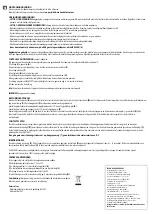
BASIC FUNCTIONALITY
The Electronic Leadscrew Control (ELS) is a cycle control for lathes and allows the automatic
execution of turning operations and the free selection of the feed rate.
Relative travel distances
In contrast to many industrial controls, the ELS operates in a relative mode: The operation to be
performed always starts from the zero point of the tool, i.e. relative to this zero point. The ad-
vantage of this approach is that there is no need to know the machine zero, and it also makes
it easier to work without having to specify starting points.
Driving distances in X are always entered as such: As real travel distance, i.e. as radius, not as
diameter!
This results in a very simple working method: Only three values must be entered for each cycle:
1. Feed rate (F)
2.
Driving distance in Z (ZP)
3. Driving distance in X (XP)
There are still some additional settings that can be edited in a parameter menu for the respec-
tive cycle, but more about that later. With the three input values F, ZP and XP, the ELS can now
be used to run any cycle that is offered.
Example:
A piece of raw material with a diameter of 50.14 mm is to be turned down to 40.00 mm over a
length of 30.00 mm. So the material changes in diameter by 10.14 mm, in radius by 5.07 mm.
We then enter -30.00 for the path in ZP, but -5.07 mm for the path in XP, since the decrease in
X corresponds to this path. So you have to convert to radius for X!
This input as radius, or real distance, is the same in all cycles. This is true for the cutting depth
of a thread or undercut as well as for the cutting depth for external turning. Therefore, when
using the ELS, rethink and use the real cutting depth for XP.
Position display
The current actual position of the axes can be seen at any time in the Diplay. With the keys X0
and Z0 you can set the position to 0.
Input of values:
Values such as F, ZP and XP are entered using the rotary knob. The cursor (>>) on the left of the
display indicates which value can currently be changed. Use the up and down keys to move the
cursor to the value to be changed. Then turn the knob to change the value.
52
Summary of Contents for ELS 4 Basic
Page 2: ......
Page 23: ...21 ...
Page 59: ...57 ...
Page 63: ...61 ...
Page 96: ...Zeroing is done as follows Possible grooves 94 ...
















































